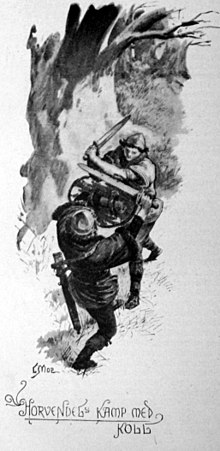Aurvandill

The names Aurvandil or Earendel (Template:Lang-non; Template:Lang-ang; Template:Lang-lng; Template:Lang-goh; Medieval Template:Lang-lat) are cognate Germanic personal names, continuing a Proto-Germanic reconstructed compound *Auziwandilaz "luminous wanderer", in origin probably the name of a star or planet, potentially the morning star (Eosphoros). By Richard Hinckley Allen (Star Names, their Lore and Meaning) the star is identified with Rigel, the "toe" of Orion, making Aurvandil being assosiative of this giant wanderer of the night.
As a Germanic name, Auriwandalo is attested as a historical Lombardic prince. A Latinized version, Horvandillus appears as the name of the father of Amleth (Shakespeare's Hamlet) in Saxo Grammaticus' Gesta Danorum. German Orentil is the hero of a medieval poem of the same name. He is son of a certain Eigel of Trier and has numerous adventures in the Holy Land. The Old Norse variant appears in purely mythological context, linking the name to a star. The only attestation of the Old English Earendel, that has been discovered, refers to a star exclusively.
Etymology
The *auzi- a compound form of *auzaz, the word found in the Anglo-Saxon goddess name Eastre, the holiday name Easter, and the term East, ultimately cognate with Hausos (Ushas), the Proto-Indo-European dawn goddess (Pokorny (1959)). The second element is from the root wand-, whence also English to wend.
Attestations
Prose Edda
Aurvandil is mentioned once in Norse Mythology, in Skáldskaparmál, a book of Snorri Sturluson's 13th century Prose Edda:
- Thor went home to Thrúdvangar, and the hone remained sticking in his head. Then came the wise woman who was called Gróa, wife of Aurvandill the Valiant: she sang her spells over Thor until the hone was loosened. But when Thor knew that, and thought that there was hope that the hone might be removed, he desired to reward Gróa for her leech-craft and make her glad, and told her these things: that he had waded from the north over Icy Stream and had borne Aurvandill in a basket on his back from the north out of Jötunheim. And he added for a token, that one of Aurvandill's toes had stuck out of the basket, and became frozen; wherefore Thor broke it off and cast it up into the heavens, and made thereof the star called Aurvandill's Toe. Thor said that it would not be long ere Aurvandill came home: but Gróa was so rejoiced that she forgot her incantations, and the hone was not loosened, and stands yet in Thor's head. Therefore it is forbidden to cast a hone across the floor, for then the hone is stirred in Thor's head.
Guesses as to the identity of this star have included the polestar, the planet Venus, Sirius and the star Rigel which forms the toe of the constellation Orion, though if Aurvandil is to be identified with the constellation Orion one would expect to find Aurvandil himself being translated into the sky, not just his toe.
Crist I
Old English Earendel appears in glosses as translating iubar "radiance, morning star".
In the Old English poem Crist I are the lines (104–108):
- éala éarendel engla beorhtast
- ofer middangeard monnum sended
- and sodfasta sunnan leoma,
- tohrt ofer tunglas þu tida gehvane
- of sylfum þe symle inlihtes.
- Hail Earendel, brightest of angels,
- over middle-yard to men sent,
- and true radiance of the Sun
- bright above the stars, every season
- thou of thyself ever illuminest.
The name is here taken to refer to John the Baptist, addressed as the morning star heralding the coming of Christ, the "Sol Invictus". Compare the Blickling Homilies (p. 163, I. 3) which state Nu seo Cristes gebyrd at his aeriste, se niwa eorendel Sanctus Johannes; and nu se leoma thaere sothan sunnan God selfa cuman wille, that is, "And now the birth of Christ (was) at his appearing, and the new eorendel (morning-star) was John the Baptist. And now the gleam of the true Sun, God himself, shall come."
Theories
Viktor Rydberg theorized the existence of a common Germanic mythological figure, Aurvandel, the greatest archer in Norse mythology and the father of Swipdag and Ullr. First he marries Groa, then Sif, who later becomes Thor's wife. Their son Ull becomes Thor's stepson and was adopted into Asgard. Aurvandil and Groa's son, Svipdag, marries Freyja.[citation needed]
Greek and Latin equivalents
Eosphorus (Ancient Greek Ἐωσφόρος, "bearer of dawn", spelled Heosphoros in the LXX Septuagint), also called Phosphorus (Ancient Greek: Φωσφόρος, "bearer of light") is the personification of the "morning star" (the planet Venus). It was often translated Lucifer ("light-bringer") in Latin. And even the traditional name for the evening prayer, vesper in the Catholic Church, carries this etymemic.
Both the Greek and Latin name, especially the latter, have been used to translate the Hebrew Helel (Venus as the "brilliant/bright/shining one") son of Shahar ("dawn") from the Isaiah 14:12. The passage originally referred to a king of Babylon full of hubris, but through a vague translation by Jerome in the Vulgate Bible the character of "Lucifer" had been reinterpreted, as early as the 2nd century AD, as the Devil (Satan), a characterization vastly different from Aurvandil/Earendel. Modern bibles usually correct this error, translating Helel more literally into the language of the bible edition, and reserving the name "Lucifer" for Satan. In the cases of both king and devil, the use of the names was a borrowing from the mythological figure.
Modern influence
J. R. R. Tolkien was inspired by references in the Crist poem, deriving both the character Eärendil, also associated with the morning star, and his use of Middle-earth from it (see Sauron Defeated p. 236f.). The Quenya phrase, "Aiya Eärendil, elenion ancalima!", literally "Hail Eärendil, brightest of stars!", bears a strong similarity to the line "Hail Earendel, brightest of angels" in Crist I, even so far as to use the same syntax as the Old English version.

